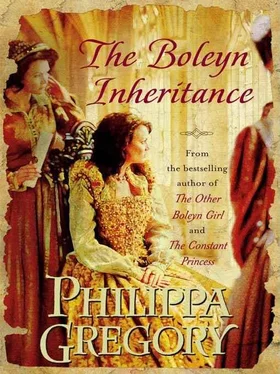I shake my head. “I would not dream of it,” I say cleverly. “I have merely brought the suggestion to you so that you might think what alliance might suit us: us Howards.”
“And what rank would suit you?” he asks silkily.
“I should like to be a duchess,” I say honestly. “I should like to wear ermine. I should like to be called Your Grace. And I should like lands to be settled on me, in my own right, not held for me by my husband.”
“And why should we consider such a great alliance for you?” he asks me, as if he already knows the answer.
“Because I am going to be the kinswoman to the next King of England,” I whisper.
“One way or another?” he asks, thinking of the sick king on his back with our slight girl working her hardest above him.
“One way or another,” I reply, thinking of young Culpepper, slowly making his way toward the queen’s bed, thinking he is following his desires, not knowing he is following our plan.
“I will think about it,” he says.
“I should like to marry again,” I repeat. “I should like a man in my bed.”
“You feel desire?” he asks, almost surprised to learn that I am not some kind of cold-blooded snake.
“Like any woman,” I say. “I should like a husband, and I should like to have another child.”
“But unlike most women, you would only want that husband if he is a duke,” he says with a small smile. “And presumably wealthy.”
I smile back. “Well, yes, my lord,” I say. “I am not a fool to marry for love like some we know.”
Anne, Richmond Palace,
April 1541
Calculation and, to tell truth, a grain of vanity took me to court for Christmas, and I think it was wise to be there to remind the king that I am his new sister. But fear brought me home again swiftly enough to Richmond. Long after the festivities and the presents are forgotten, the fear remains. The king was merry at Christmas but was in a dark mood for Lent, and I was glad to be here, and happy to be forgotten by the court. I decided not to go to court for Easter; nor shall I go with them on the summer progress. I am afraid of the king; I see in him both my brother’s tyranny and my father’s madness. I look at his darting, suspicious eyes and think that I have seen this before. He is not a safe man, and I think the rest of the court will come to realize that their handsome boy has turned into a strong man, and now the man is slowly becoming beyond control.
The king speaks wildly against reformers, Protestants and Lutherans, and both my conscience and my sense of safety encourage me to attend the old church and observe the old ways. Princess Mary’s faith is an example to me, but even without her I would be bending my knee to the sacrament and believing that wine is blood and bread is flesh. It is too dangerous to think otherwise in Henry’s England; not even thoughts are safe.
Why should he, who has indulged his own desire in his power and prosperity, look round like some savage animal for others whom he can threaten? If he were not the king, people would say that this must be a madman, who marries a young wife and, within months of the wedding, is hunting out martyrs to burn. A man who chose the very day of his wedding for the execution day of his greatest friend and advisor. This is a mad and dangerous man, and slowly everyone is coming to see it.
He has taken it into his head that there is a plot by reformers and Protestants to overthrow him. The Duke of Norfolk and Archbishop Gardiner are determined to keep the church as it is now, stripped of its wealth but basically Catholic. They want the reform to freeze where it is now. Little Kitty can say nothing to contradict them, for she knows nothing; in all truth, I doubt she knows what prayers are in her book. Obedient to their hints, the king has ordered the bishops and even the parish priests to hunt down men and women in the churches all over England who do not show proper respect at the raising of the host, charge them with heresy, and have them burned.
The butchers’ market at Smithfield has become a place for human grief as well as beasts’, it has become a great center for burning martyrs, and there is a store of fagots and stakes kept for the men and women whom Henry’s churchmen can find to satisfy him. It is not yet called the Inquisition, but it is an Inquisition. Young people, ignorant people, stupid people, and the very few with a passionate conviction are questioned and cross-questioned on little points of theology till they contradict themselves in their fear and confusion, and are declared guilty, and then the king, the man who should be father to his people, has them dragged out and burned to death.
People are still talking of Robert Barnes, who asked the very sheriff who was tying him to the stake, what was the reason for his death? The sheriff himself did not know and could not name his crime. Nor could the watching crowd. Barnes himself did not know as they lit the flames around his feet. He had done nothing against the law; he had said nothing against the church. He was innocent of any crime. How can such things be? How can a king who was once the handsomest prince in Christendom, the Defender of the Faith, the light of his nation, have become such a – dare I name it? – such a monster?
It makes me shiver as if I were cold, even here in my warm privy chamber at Richmond. Why should the king have grown so spiteful in his happiness? How can he be so cruel to his people? Why is he so whimsical in his sudden rages? How does anyone dare to live at court?
Jane Boleyn, Hampton Court,
April 1541
We have our candidate for the queen’s favor and I have done next to nothing to hasten the courtship. Without any prompting but a girl’s desire, she has fallen head over heels in love with Thomas Culpepper, and by all I can see, he with her. The king’s leg is giving him less pain, and he has come out from his private rooms since Easter and the court is back to normal again; but there are still many chances for the young couple to meet, and, indeed, the king throws them together, telling Culpepper to dance with the queen, or advising her on her gambling when Culpepper is dealing. The king loves Culpepper as his favorite groom of the bedchamber, and he takes him everywhere he goes, delighting in his charm and his wit and his good looks. Whenever he visits the queen, Culpepper is always in his train, and the king likes to see the two young people together. If he were not blinded by his monstrous vanity, he would see that he is throwing them into each other’s arms; but, instead, he sees the three of them as a merry trio and swears that Culpepper reminds him of his boyhood.
The girl queen and the boy courtier are playing pairs together, with the king overlooking both of their cards like an indulgent father with two handsome children, when the Duke of Norfolk makes his way around the room to talk to me.
“He is back in her rooms? She is bedding the king as she should?”
“Yes,” I say, hardly moving my lips, my face turned toward the handsome young pair and their doting elder. “But to what effect, no one can know.”
He nods. “And Culpepper is willing to service her?”
I smile and glance up at him. “As you see, she is hot for him, and he longs for her.”
He nods. “I thought as much. And he is a great favorite with the king; that’s to our advantage. The king likes to see her dance with his favorites. And he is a conscienceless bastard; that’s to our advantage, too. D’you think he is reckless enough to risk it?”
I take a moment to admire the way the duke can plot with his eyes on his victim, and anyone would think he was talking of nothing but the weather.
“I think he is in love with her; I think he would risk his life for her right now.”
Читать дальше
Конец ознакомительного отрывка
Купить книгу












